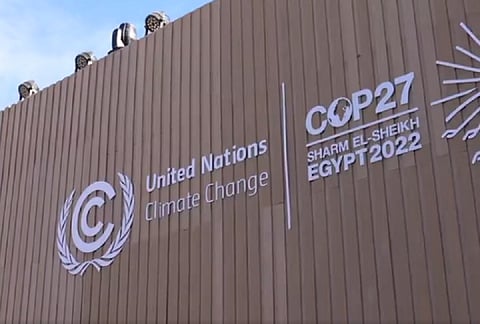

The 27th Conference of Parties (COP27) to the United Nations Framework Convention on Climate Change in Sharm El-Sheikh, Egypt, began November 7, 2022. Here’s a look at what happened on day 10 of COP27 climate talks.
The draft text for a cover decision is yet to be produced by the COP27 Presidency as of 7.30 am November 17, leading many to wonder how long discussions will continue to arrive at a consensus on the document once released. Just two days of the summit remain.
.............................................................................................................................................................
Negotiations have concluded on the report of the Paris Agreement Implementation and Compliance Committee, Kyoto Protocol Compliance Committee, Santiago Network on loss and damage and Adaptation Fund, announced a letter from the COP27 President November 16.
Negotiations on the mitigation work programme, Global Goal on Adaptation, loss and damage finance, climate finance, Article 6 and agriculture are now pending.
.............................................................................................................................................................
The Group of 77 bloc produced a proposal on loss and damage, containing specific demands for the final text of the agenda item.
A fund must be established “for assisting developing countries in meeting their costs of addressing non-economic and economic loss and damage associated with the adverse effects of climate change,” it stated.
A new 4-page draft text on the mitigation work programme has been released and still contains many brackets for discussions. The adherence to the work programme of the principles of equity enshrined in the UNFCCC is listed as an option, with the alternative being to delete it entirely.
Options are also provided on the timeline, for the work programme to be 1-2 years long or to run until 2030.
.............................................................................................................................................................
Brazilian President-elect Luiz Inácio Lula da Silva received a hero’s welcome when he addressed crowds at a speech at COP 27 on Wednesday evening.
Stating that ‘Brazil is back’ on climate action, he promised to do whatever it takes to bring deforestation in the Amazon down to zero. He also offered to host the 2025 COP summit in Brazil.
.............................................................................................................................................................
COP27 President Sameh Shoukry conducted a stocktake of the situation and designated pairs of ministers to work on the each of the agenda items that required high-level political negotiations, special representative and Ambassador Wael Aboulmagd said at a press briefing.
Inputs have been received from parties on the cover decision text on priorities and expectations along with red lines, which cannot be crossed, he said. The third part makes negotiations difficult.
The pace of COP 27 has been typical, but some delegations are holding up work in several negotiation rooms, he highlighted. However, there is still hope for progress and last-minute decisions in line with people’s expectations worldwide.
Announcements made by countries at the G20 summit in Bali would have an impact on the negotiations at COP.
The principles of equity are enshrined in Article 2 of the Paris Agreement and cannot be done away with, he said on some countries waning the principles of equity and common but differentiated responsibility out of the cover decision text.
“We are aware of the various positions on that and we are working now as the presidency team but moving forward with all parties to ensure that everyone finds the language that accommodates their perspective in an appropriate way but also one that is faithful to the legal agreement that we have all ratified in our internal processes”, he said.
On not meeting the goal of $100 billion in climate finance, he said that it is not the core of the process and that the figure was more of a gesture from the developed countries.
The updating of NDCs from countries can also continue after COP27. The transparency framework under the UNFCCC ensures accountability.
Still, pledges outside the UNFCCC process being made by countries have to be made accountable by public pressure through media and other means, according to Aboulmagd.
The Santiago Network will be operationalised soon, he said on loss and damage negotiations but did not divulge any information on the establishment of a finance facility. Meaningful progress was required on this, he added.
.............................................................................................................................................................
Experts at a side event highlighted that the fossil fuel subsidies problem is huge and that government support for fossil fuel subsidies in 51 countries almost doubled. They called for the need to end fossil fuel subsidies.
Canada is subsidising companies extracting and producing fossil fuel, said Julia Levine, energy programme manager, environmental defence, Canada.
Between 2015-2019, the Canadian government provided $100 billion for fossil fuel production. “So far this year, the government has already committed 16 billion dollars,” she stressed.
The country could have instead directed this money to a globally just energy transition, delivered Canada’s fair share of international climate finance or addressed loss and damage.
In India, fossil fuel attracts nine times more subsidies than clean energy, said Shruti Sharma, senior policy advisor in the International Institute Of Sustainable Development’s (IISD) energy programme.
In Indonesia, 94 per cent of the support to the energy sector went to the production and consumption of fossil fuels and 1 per cent to renewables from financial years 2016-2020, she added.
Social costs [mortality, diseases and climate change] of fossil fuel in South Africa far exceed subsidies and revenues generated from them, Chido Monzado from IISD pointed out.
The level of fossil fuel subsidies generated from 2010-2020 in Argentina could help transition to a 100 per cent renewable electricity generation park by 2045, while Brazil’s subsidies to fossil fuel totalled $21.9 billion in 2021.
.............................................................................................................................................................
The fossil fuel lobby could threaten outcomes from COP27, such as delivering strong language for a phase-out of all fossil fuels — coal, oil and gas, according to a press briefing from Climate Action Network.
Further, Egypt’s long list of elements likely to be considered for the cover decision did not mention fossil fuels. This is despite India calling for a phase down of all fossil fuel and the EU backing it.